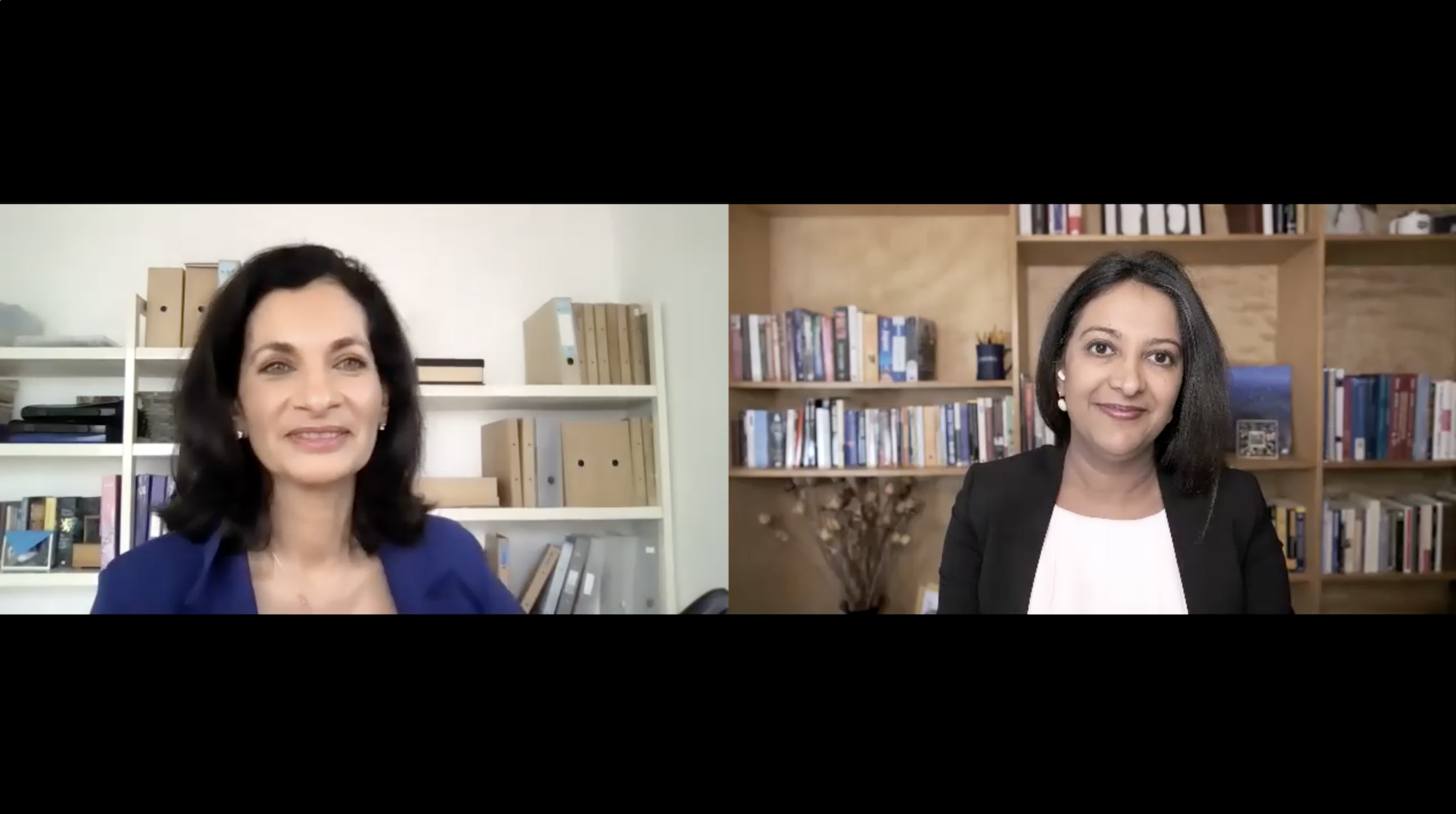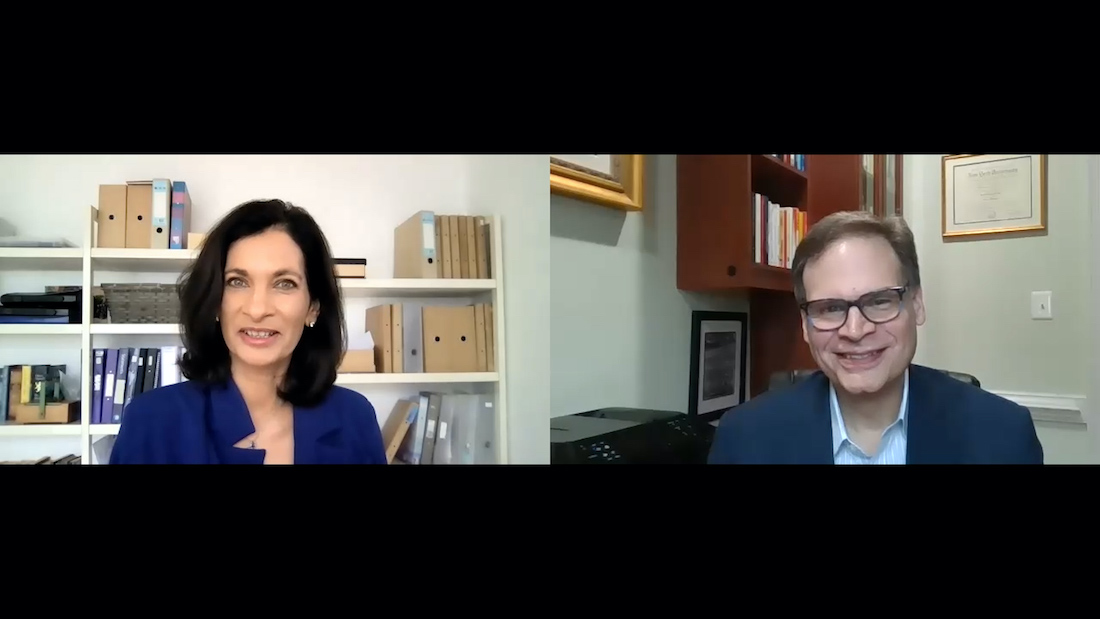How can leaders ensure resilience at work when a global health crisis like the COVID-19 pandemic hits? How can they respond to uncertainty and challenges and transform their businesses to make sure they remain competitive? What is the private sector’s key role in vaccinating the planet against COVID-19?
These are just some of the questions host Nisha Pillai put to guests in the second episode of Resilience Recast, a five-part podcast series from Salesforce in collaboration with Reuters.
Entitled ‘Resilience at Work’, Dr. Ashwini Zenooz, former Chief Medical Officer at Salesforce, and David Rodriguez, Executive Vice President & Global Chief HR Officer, Marriott International explored:
How some of the most successful global businesses have adapted their strategies in the face of the pandemic
How technology will continue to be key in keeping populations safe
How business leaders are rethinking the future of health and wellbeing at work
Vaccinating the world against COVID-19
With the largest vaccination programme in history underway, ensuring the distribution of vaccinations in a way that is safe, fast, and equitable is a mammoth task for health authorities and governments everywhere.
Gavin Patterson, President and Chief Revenue Officer at Salesforce opened the episode by highlighting how private and public sector partnerships can help make it a success. With each playing to their strengths, he explained, “It’s a great opportunity for business to build back trust and be seen as delivering positive change in wider society."
Leading with values and innovation
In the early days of the pandemic, businesses had to react swiftly and instinctively. As David explained, Marriott International immediately went back to its core principles, to ensure the wellbeing of the organisation’s stakeholders, employees, customers, owners, and franchises. “I think the currency of most importance these days is trust,” he added. In this regard, Marriott International started from a strong foundation.
“Communicating is so important in any relationship of trust and being honest and transparent about actions that we’re taking to ensure everyone’s safety; that’s been the focus,” said David Rodriguez.
“It’s not so much about inventing things, new practices, but making sure that the fundamental way that we run the business continues to prevail.”
Among other initiatives, Marriott created a global Cleanliness Council to demonstrate its commitment to keeping its properties safe for guests and employees. They also deployed technology to enable guests to check-in and open their hotel room door with their mobile phones.
From facilitating guests’ direct communication with the hotel via text communication and delivering mobile food service, in many ways, David says, the pandemic has accelerated the evolution of the hotel industry.
Resilience Recast host Nisha Pillai and Dr. Ashwini Zenooz, former GM & Chief Medical Officer, Salesforce
Giving Employees Confidence
In the U.S., although not mandated, Marriott strongly encourages it's employees to be vaccinated. They do this by providing access to the most up-to-date information about the vaccine and flexibility to have time off work to get vaccinated. They also offer a financial reward once they’re vaccinated.
“We want them to be informed, to have the confidence to take care of themselves,” David explains.
For David, all of this has built resilience across the organisation throughout the pandemic. Resilience, he explained, is not a tactic. It isn’t something that can be achieved in response to a crisis like the pandemic; it’s a discipline cultivated over time.
This explains why the Marriott’s concern for their employees is an ongoing focus; the programs they already had in place to support their peoples’ emotional, physical, and financial wellbeing have helped the organisation to weather the COVID storm.
“The resilience of your workforce doesn’t start with a program you may roll out today to deal with a crisis like a pandemic. Resilience starts with fundamentally how you run your business from the very start, in a very holistic way.”
The role of the private sector is more than just a focus on health and wellbeing at work. Everyone in an organisation needs to be engaged in order to ensure enough people are vaccinated to make a difference in the overall spread of the virus. A combination of education and incentivisation, as demonstrated by Marriott, will help to get buy-in among the workforce.
Resilience at work: Technology’s role
Dr. Ashwini Zenooz – or Dr. Ash — explains how during her time at Salesforce her role expanded as a result of the pandemic. “When I first started, my role was developing and preparing industry solutions for our healthcare and lifestyle customers; but since the pandemic, we’re thinking about everything from remote work arrangements to returning to office solutions.”
These solutions have helped across industries, for instance, in manufacturing, helping front-line workers, as well as in education.
Dr. Ash explains how Salesforce was one of the first organisations across the globe to go remote in the early phase of the pandemic.
“We quickly realized that we needed to start thinking about a virtual and remote model, not only for our employees but all of our events and everything else that we do.”
Recognising the need for businesses and governments to keep their people safe at work, Salesforce rapidly developed Work.com as a way for organisations to build resilience; providing emergency response management, contact tracing, and a command centre, consolidating all information in one place.
In January of this year, Salesforce released Vaccine Cloud, a holistic, end-to-end vaccine management solution. From inventory management of vaccines and relevant equipment, to employee training and enablement, Vaccine Cloud has helped around 150 global organisations in the healthcare ecosystem to deliver vaccines, including governments and not-for-profit organisations.
Importance of partnerships
In addition to David’s emphasis on the benefits of incentivisation to encourage vaccination, Dr. Ash stressed the importance of educating people and partnerships. “The biggest part of this is you want people to feel safe… We can’t just have the media and physicians talking about this. You need everybody to understand what’s going on the front lines so that you can safely get everybody vaccinated.”
“This [mass vaccination] is not something that you can do in silos. Without collaboration, we’re not going to get there.”
Resilience Recast host Nisha Pillai and David Rodriguez, Executive Vice President & Global Chief HR Officer, Marriott International
The future of resilient work is in the cloud
Across all industries, the pandemic has accelerated the shift to cloud-based technologies. It is also reimagining the ways we work. For Dr. Ash, “I truly believe that the nine-to-five workday is dead. We have to allow for our employees to have flexible work times. We have to allow for better remote work tools, equipment that’s ergonomic, everything that can happen remotely. I think that’s where we’re headed, at least for those of us who are able to work remotely, even in a hybrid model. We need to ensure that all of those tools are available and that you have safe working environments.”
“At Salesforce I’ve heard our CEO say quite a few times that the future of work is in the cloud. And I believe for those of us who can work remotely, that’s pretty much going to be the case.”
“If we continue this path and invest in the things that we’ve been doing, invest in technology transformation, invest in science and information sharing, we’re all going to fare better in the future.”









